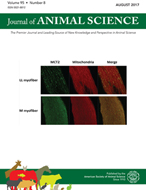-
Views
-
Cite
Cite
G. I. Petersen, H. H. Stein, Novel procedure for estimating endogenous losses and measurement of apparent and true digestibility of phosphorus by growing pigs,, Journal of Animal Science, Volume 84, Issue 8, August 2006, Pages 2126–2132, https://doi.org/10.2527/jas.2005-479
Close - Share Icon Share
ABSTRACT
An experiment was conducted to evaluate a novel procedure for estimating endogenous losses of P and for measuring the apparent total tract digestibility (ATTD) and true total tract digestibility (TTTD) of P in 5 inorganic P sources fed to growing pigs. The P sources were dicalcium phosphate (DCP), monocalcium phosphate (MCP) with 50% purity (MCP50), MCP with 70% purity (MCP70), MCP with 100% purity (MCP100), and monosodium phosphate (MSP). A gelatin-based, P-free basal diet was formulated and used to estimate endogenous losses of P. Five P-containing diets were formulated by adding 0.20% total P from each of the inorganic P sources to the basal diet. A seventh diet was formulated by adding 0.16% P from MCP70 to the basal diet. All diets were fed to 7 growing pigs in a 7 × 7 Latin square design, and urine and feces were collected during 5 d of each period. The endogenous loss of P was estimated as 139 ± 18 mg/kg of DMI. The ATTD of P in MSP was greater (P < 0.05) than in DCP, MCP50, and MCP70 (91.9 vs. 81.5, 82.6, and 81.7%, respectively). In MSP, the TTTD of P was 98.2%. This value was greater (P < 0.05) than the TTTD of P in DCP, MCP50, and MCP70 (88.4, 89.5, and 88.6%, respectively). The ATTD and the TTTD for MCP70 were similar in diets formulated to contain 0.16 and 0.20% total P. Results from the current experiment demonstrate that a P-free diet may be used to measure endogenous losses of P in pigs. By adding inorganic P sources to this diet, the ATTD of P can be directly measured and the TTTD of P may be calculated for each source of P.





